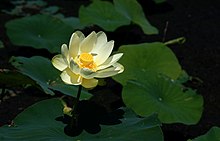Nelumbo lutea
| Nelumbo lutea | |
|---|---|

| |
| Scientific classification | |
| Kingdom: | Plantae |
| Clade: | Tracheophytes |
| Clade: | Angiosperms |
| Clade: | Eudicots |
| Order: | Proteales |
| Family: | Nelumbonaceae |
| Genus: | Nelumbo |
| Species: | N. lutea
|
| Binomial name | |
| Nelumbo lutea | |
Nelumbo lutea is a species of flowering plant in the monotypic family Nelumbonaceae. Common names include American lotus, yellow lotus, water-chinquapin, and volée. It is native to North America. The Linnaean binomial Nelumbo lutea (Willd.) is the currently recognized name for this species, which has been classified under the former names Nelumbium luteum and Nelumbo pentapetala, among others.[1]
Description
American lotus is an emergent aquatic plant. It grows in lakes and swamps, as well as areas subject to flooding. The roots are anchored in the mud, but the leaves and flowers emerge above the water's surface. The petioles of the leaves may extend as much as 2 m (6.6 ft) and end in a round leaf blade 33–43 cm (13–17 in) in diameter. Mature plants range in height from 0.8 to 1.5 m (2.6 to 4.9 ft).[2]
Flowering begins in late spring and may continue into the summer. The specific name means "yellow" in Latin and refers to the flowers, which may be white to pale yellow. The flowers measure 18–28 cm (7.1–11.0 in) in diameter and have 22-25 petals.[2]
Range
The native distribution of the species is Minnesota to Florida, Mexico, Honduras, and the Caribbean.

It was apparently distributed northwards in the United States by Native Americans who carried the plant with them as a food source.[3]
Uses
This plant has a large tuber that is used as a food source. This may be the plant called "macoupin" in Miami-Illinois. The seed is also edible and is known as "alligator corn".[4]
It is widely planted in ponds for its foliage and flowers. American Lotus spreads via creeping rhizomes and seeds. This species has been crossed with N. nucifera to create many hybrids. Seeds may be propagated by scarifying the pointed tip of the seed with a file then soaking in water. Propagation is also possible by division of established plants.
Other media
Disney's character Princess Tiana (Disney) wears as her iconic princess dress, a gown fashioned from a yellow Nelumbo lutea.
References
- ^ "Nelumbo lutea". Integrated Taxonomic Information System.
- ^ a b Slocum, Perry D. (2005). Waterlilies and Lotuses: Species, Cultivars, and New Hybrids. Timber Press. p. 236. ISBN 978-0-88192-684-2.
- ^ Wiersema, John H. (1997). "Nelumboanaceae". Flora of North America. 3.
- ^ Mariani, John F. (1999). Encyclopedia of American Food and Drink. Lebhar-Friedman Books. p. 5. ISBN 0-86730-784-6.




